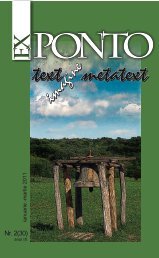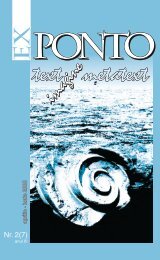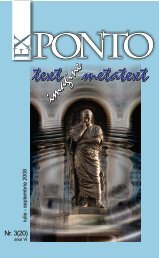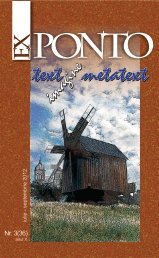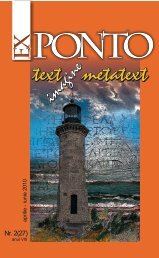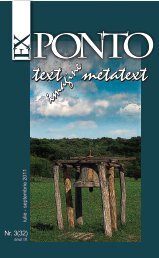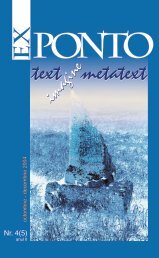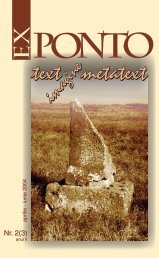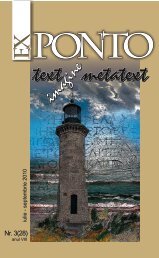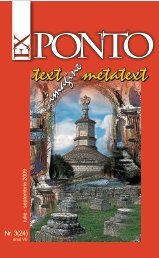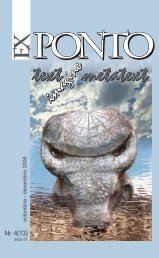Nr. 3 (12) anul IV / iulie-septembrie 2006 - ROMDIDAC
Nr. 3 (12) anul IV / iulie-septembrie 2006 - ROMDIDAC
Nr. 3 (12) anul IV / iulie-septembrie 2006 - ROMDIDAC
- No tags were found...
You also want an ePaper? Increase the reach of your titles
YUMPU automatically turns print PDFs into web optimized ePapers that Google loves.
Ex Ponto nr.3, <strong>2006</strong>in rapid transition to some form of political community. By using the culturalencounter narrated by Álvaro Velho as a metaphor of international relations,Adriano Moreira is clearly drawing on Vitoria’s claims about the relationsbetween the new and the old worlds. Once again, the point here refers to theinsufficiency of political realism in order to get hold of the subtleties inherentto the syncretic nature of international relations. As Martin Ortega wellacknowledges, and despite his having been a supporter of the expansion ofthe Christian faith and civilization throughout the Americas, Vitoria “cannot beconsidered simply a realist because he always understood the relations withthe ‘barbarians’ as a moral question” 11 . The problematique of the relations with‘barbarians’ as a metaphor for relations with the ‘other’ is dealt with at lengthby Martin Wight in his International Theory (1992). The three traditions heindividuates in the book are crucial in my view to the understanding of Vitoria’sinfluence over Adriano Moreira. Rationalism is the framework used by bothauthors, which means that the encounter with the ‘other’ becomes a culturalencounter structured around the possibility of their being common values,rules and interests and the possibility of resorting to a common languageof communication. With this assumption in mind, their perspective departstherefore from that other one according to which every encounter of subjectsand groups cannot be but the confrontation of incommensurable ways of lifeand the consequent dispute of irreconcilable interests. The moral question inthe relations with ‘barbarians’ underlined by Ortega is introduced by Wight interms of a natural law in its capacity of legislation of reason serving as patternof ethical conduct within a universal legal community. By including Vitoria in hislist of rationalists, Wight remarks that “[i.]t is a principle of Rationalist theorythat barbarians have rights under natural or moral law” <strong>12</strong> . However, he alsoacknowledges that the rationalist support for dialogue and communicationand for the responsible exercise of power at the international sphere onbehalf of moral values risks becoming a realist strategy for the acquisition andmaintenance of power: “[t.]he Rationalist argument that we must do the bestwe can in our situation is of course capable, like every other, of perversion.After all, ‘our situation’, in international politics, is defined by ourselves and itis easy to define it so as to suit our appetites and wishes” 13 .Adhering to the via media principle according to which there is more tointernational relations than the realist suggests but less than the cosmopolitandesires, the rationalist is reluctant to resolve once and for good the confrontationbetween the values of statism and universalism and opts instead for bridgingthe gap and promoting the dialogue between both in the search for existentialsyntheses in which the opposing terms never quite dissolve into one another.As Ortega concludes, “Vitoria is rationalist, above all, because he realises thathis state is the only one which can defend the Indians and protect the rightswhich he proclaims” 14 . This claim suggests therefore that rationalism points ata mitigated universalism, given that the framework of universal moral referencein which the relations with the ‘other’ have necessarily to be located alwaysconfronts itself with the more particular ethical sphere of the state. In its qualityof situated reason, Adriano Moreira’s ‘reasonability’ draws on the syncretismof a mitigated universalism characterising human sociableness and sets outto understand the dynamics of a triple temporal horizon in which alternativepolitical emergencies coexist. Resorting once more to Ortega, I would arguethat rationalists are authors navigating between statism and universalism andthat this is the very method according to which they establish their distinctive170




